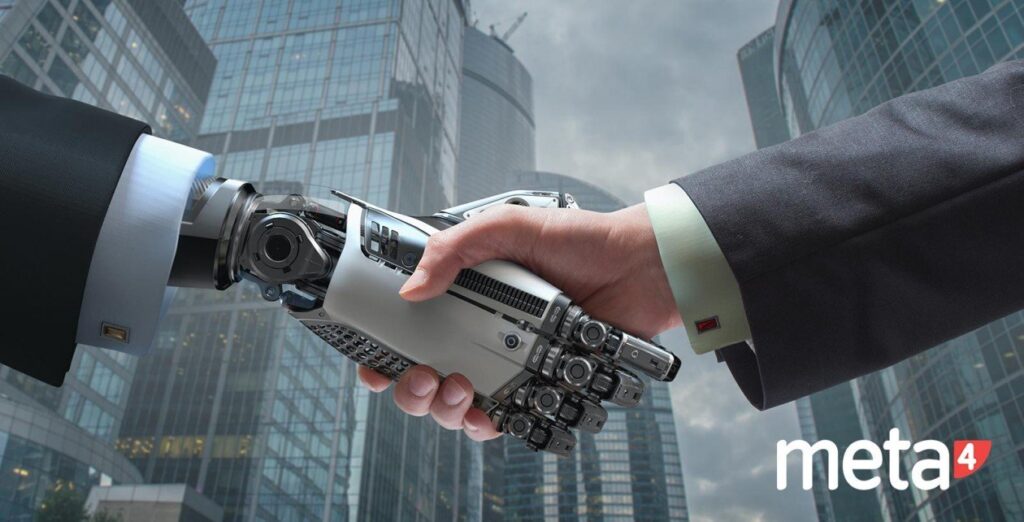When we sat down to start writing this article on 2019 trends, we realized that for this year we clearly saw two great forces developing in parallel: on one side, the unstoppable digitization and automation of almost all aspects of our personal and working lives, and on the other, the rise of soft skills compelling a return to what makes us more human, such as the ability to communicate, the capacity for creation, cooperation, flexibility, empathy, and more.
It seems that the more technological our environment becomes, the more we try to “rehumanize” ourselves—as if both trends were the two sides of the same coin. The human being, facing the technological onslaught, goes back to look inwardly to find out what differentiates him from machines and tries to fully harness these characteristics so not to lose his identity.
Next, we will see some examples of these two trends applied to the HR world.
Shifting towards extreme digitization and automation in organizations
Until recently, we talked about the digital world and automation broadly in the abstract, as these were changes that we were familiar with, but whose impact had not yet become an integral part of our day to day lives. Today, it’s different. This year, more than ever, we have begun to see the real application of all our conjectures we’ve made to date.
Here are some of the trends that many organizations are beginning to put into practice:
- Virtual assistants: Increasingly popular, as the employee service can be automated through such assistants. Bots are the most popular form of chat or voice assistance, but they are also beginning to look like virtual robotic or holographic representations. Virtual assistants offer a two-fold benefit: HR saves on workforce costs and can respond faster in a more personalized manner to their employees’ needs anytime and anywhere.
- Applications for mobile employee services: These respond to multiple needs of the workforce, among others, while facilitating internal communication. Through these applications, employees can manage their corporate, health and wellness benefits; as well as organize their means of transport to the company, among others. This type of application usually improves employee engagement within their organization.
- RPA platforms: Robot process automation platforms are one of the revolutions in the digitalization of HR tasks. These robots perform different administrative processes such as hire, data upload, communications, alerts, and more. This brings considerable savings in time and in expenses. According to the renowned HR technology guru, Josh Bersin, “Demand for RPA/AI is increasing as organizations seek to drive HR delivery model efficiency, effectiveness, and support scalability, while improving costs”.
- Big Data and Machine Learning: We have been talking about these trends to do with data intelligence for a long time, and there are already many organizations that have incorporated them in their day to day. For instance, in recruitment processes, through these new technologies, you can define ideal recruitment profiles, design absenteeism models, (personality-job fit models, and more. All with the purpose of, among others, anticipating talent flight to be able to take steps to retain the best professionals.
Shifting towards extreme humanization in organizations
In a recent article we published about the Unleash event (previously called HR Tech World) that took place in Amsterdam last year, we mentioned how struck we were by the recurring topic in many talks that revolved around bringing back the human element in organizations.
That’s why we weren’t surprised that two of the keynote speakers were the Buddhist monk, Matthieu Ricard, and the psychologist, Esther Perel. Just as we have said above, the actual adoption of digital technologies and automation under way in organizations is ostensibly fanning a new reflection on who we are as a species, how we can work better with machines, and at the same time strengthen what makes us different from machines.
Some of key ideas that are shaping this trend in rehumanizing organizations include the following:
- The soft skills take centre stage: as we have said at one point or another within this blog, the traditional curriculum is giving way to other types of social and communication skills. A recent article by the leadership expert, Darcy Eikenberg, published in Forbes magazine, titled “Why soft skills are more harder than they look” mentions four skills: leadership, communication, collaboration and time management. The article underscores that even though these skills are important today, many companies do not have a culture prepared for developing them. Thus, she recommends taking time to promote these skills, as well as risking to do things differently from the usual ways. Moreover, the article stresses that in organizations where there is better communication, there is less fear of failing, and thus eases decision-making. Soft skills are characteristically human ones, and for now they remain quite complicated to automate so it seems.
- Employee centricity and employee experience: These terms have become the new mantras of HR. So much so, that some personnel departments are now called employee experience departments or have specific sections called this, like in the virtual rental housing company, Airbnb. Today, organizations place the employee at the centre and aim to offer experiences that unite various areas of their lives, such as their personal well-being, physical well-being or assimilation into work teams. Thus, we are already seeing how the usual way of working of any HR professional involves designing personalized experiences for a segment of employees, at a given moment in time.
- Employee wellness: One of the characteristics of this century is the cult of the body. Activities to take care of it, such as sports or healthy eating are becoming increasingly important. So, companies are already providing employees with mobile applications to manage their health and sports routines, gym vouchers, talks on healthy eating, and more. Moreover, with the development of neuroscience, there is more and more awareness of the importance of physical health for mental development and that’s why one of the most valued trends in today’s working world is mindfulness. In addition to improving employee health, such measures have been shown to positively impact on employee engagement.
Seeing all these trends makes for a very interesting 2019. The human being, increasingly both more aware and supported by machine, will continue to explore new ways of doing different tasks, which will surely lead to new forms of work that we have yet to envision.






